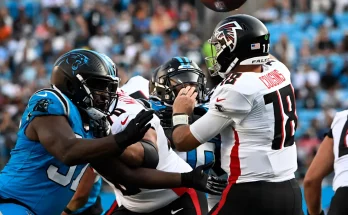The New York Rangers find themselves at a critical crossroads as uncertainty swirls around the future of Artemi Panarin, one of their most dynamic and beloved players. Panarin, a superstar winger known for his electrifying skill and scoring prowess, has been a key figure in the Rangers’ resurgence as a serious contender in the NHL. However, with his contract situation unresolved and negotiations dragging on, the team risks more than just losing a player—they risk destabilizing their locker room chemistry, alienating their fanbase, and undermining the foundation of a promising future.
Artemi Panarin’s impact on the Rangers since joining the franchise has been nothing short of transformative. His offensive creativity and consistent production have helped elevate the team’s competitiveness, and his charismatic presence has made him a fan favorite. Panarin’s ability to create scoring chances out of thin air and his knack for clutch performances have turned many games in New York’s favor. It is no exaggeration to say that Panarin has been a linchpin in the Rangers’ recent success, and his importance extends beyond the ice. His leadership and experience have provided younger players with a role model and a standard of excellence to strive for.
Yet, despite his undeniable value, the Rangers have allowed negotiations over Panarin’s contract to drag on without resolution. The prolonged silence has sparked rumors and speculation, fueling uncertainty within the organization and among supporters. This indecision sends a troubling signal not only to Panarin himself but also to the rest of the team. When a star player’s future hangs in the balance, it creates an environment ripe for distraction. Teammates begin to wonder about the stability of the roster, the direction of the franchise, and whether the team can maintain its momentum without key contributors.
The risks of this indecision are multifaceted. First, the locker room atmosphere can suffer. Athletes thrive on certainty and trust, and when there is doubt about the commitment of a cornerstone player, it can fracture team unity. Players may start to question management’s intentions or priorities, leading to diminished morale. The cohesion that is essential for playoff success can unravel quickly if players feel the organization is not fully behind the group on the ice.
Second, the fanbase feels the impact deeply. Rangers fans are passionate and invested, craving clear direction and decisive action. Lingering contract uncertainty can breed frustration and erode the goodwill built through exciting performances and hopeful playoff runs. Fans want to see their team retain its stars and build toward sustained success, not appear hesitant or reactive. The media scrutiny intensifies as well, putting additional pressure on the team’s leadership and contributing to a narrative of dysfunction.
From a strategic standpoint, allowing Panarin’s future to linger also constrains the Rangers’ roster flexibility. Management must weigh the possibility of losing a top scorer against the need to build a balanced and competitive team. Other players waiting for clarity may hesitate to fully commit to the franchise if they sense instability. Moreover, the salary cap implications loom large. The Rangers have limited room to maneuver, and without a timely decision, they risk losing leverage in negotiations or missing out on potential trade opportunities that could benefit the team’s overall composition.
The timing could not be worse. As the Rangers aim to solidify their place among the NHL’s elite, every piece of the puzzle must fall into place. Panarin is not merely a player to be replaced; he is an integral part of the team’s identity and offensive engine. The longer his status remains unclear, the more difficult it becomes to plan for the future. Whether the outcome is a contract extension, a trade, or another scenario, the uncertainty itself is a distraction that the team can ill afford.
It is important to consider Panarin’s perspective in this situation as well. As a top-tier athlete in his prime, Panarin seeks stability, respect, and a competitive environment that matches his ambitions. Prolonged contract limbo can affect his mindset and performance, as the cloud of uncertainty weighs on his focus and motivation. A player of his caliber deserves clear communication and commitment from the organization. Delaying these conversations risks alienating him and potentially driving him toward other opportunities where his value is recognized promptly and adequately.
Looking ahead, the Rangers must act decisively to resolve Panarin’s situation. Transparency and open communication with both the player and the public can help ease tensions and restore confidence. Whether it results in an extension that secures Panarin for the coming years or a trade that brings new assets to the team, a resolution is imperative. The goal should be to maintain competitive integrity and foster a positive team culture that attracts and retains elite talent.
In conclusion, the New York Rangers are at a pivotal moment regarding Artemi Panarin’s future. The prolonged uncertainty does more harm than good, creating risks that extend beyond the ice into the heart of the organization and its fanbase. The path forward requires clear decision-making, respect for the player’s contributions, and a strategic approach that balances short-term success with long-term growth. Failure to act swiftly and decisively could unravel the progress made and set the team back in their quest for NHL glory. In the high-stakes world of professional hockey, nothing good comes from letting a superstar’s fate linger in doubt.



